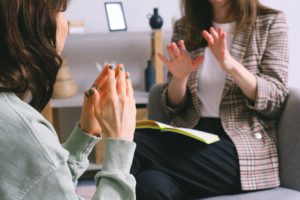 Anxiety is characterized by intense feelings of unease, worry, and/or fear about an imminent threat, often referred to as an “impending doom.” These feelings often include catastrophic thinking, obsessive thoughts, rumination about ourselves and the world, feeling as if we’re losing control, and panic attacks. Anxiety is a psychological response that everyone experiences at some point in their life. However, we often do not always realize that what we’re feeling and experiencing is anxiety. How do we begin to cope with anxiety when it negatively affects multiple areas of our lives? Here are some tips that can help you reduce the intensity of your anxiety and make you feel more at ease daily.
Anxiety is characterized by intense feelings of unease, worry, and/or fear about an imminent threat, often referred to as an “impending doom.” These feelings often include catastrophic thinking, obsessive thoughts, rumination about ourselves and the world, feeling as if we’re losing control, and panic attacks. Anxiety is a psychological response that everyone experiences at some point in their life. However, we often do not always realize that what we’re feeling and experiencing is anxiety. How do we begin to cope with anxiety when it negatively affects multiple areas of our lives? Here are some tips that can help you reduce the intensity of your anxiety and make you feel more at ease daily.
How To Cope With Anxiety
- Seek psychotherapy – With anxiety we often get stuck in our own heads and feel as if we’re all alone. Speaking to a professional will not only help normalize and validate your feelings but give you a safe place to explore them. A therapist can help you learn coping skills to manage and reduce the intensity of your symptoms. Look for someone who specializes in behavioral therapies such as cognitive behavior therapy (CBT), dialectical behavior therapy (DBT), and acceptance and commitment therapy (ACT). A therapist specializing in psychoanalysis will help you gain insight. You can also develop self-awareness and explore and understand how your past experiences impact your present behaviors and emotions.
- Consider medication – When psychotherapy and coping skills are only minimally helpful, and your anxiety is having a negative effect on your daily life, psychotropic medication may help you manage your symptoms and reduce the intensity of your anxiety however this approach is most effective when combined with other treatments such as psychotherapy (e.g., DBT, CBT, ACT, Psychoanalysis, etc.).
- Reduce/avoid mood- and mind-altering substances – Mood/mind-altering substances include alcohol, caffeine, nicotine, unprescribed medications, and illegal drugs. In other words, any substance that may alter the way you think and feel. We often use substances to self-medicate and improve how we feel. However, they do have a long-term impact on brain chemistry and hormones, negatively affecting our mental health. With substance use, we experience cycles of highs and lows. For instance, alcohol is a depressant and can result in feelings of sadness and anxiety once it wears off; caffeine is a stimulant and can trigger anxiety symptoms including racing heart and racing thoughts. In order to reduce the intensity of your anxiety and relieve your symptoms, it is important to reduce or avoid substances that influence the way we think or feel about ourselves and the world around us.
- Identify triggers – Triggers are people, places, and things that induce anxiety. Sometimes, they are fairly obvious to us such as certain people, specific places, or caffeine or alcohol consumption. Less readily identifiable triggers include work stressors, finances, trauma, fears, and chronic illnesses. One way to identify triggers is to talk with friends and/or family to process what you were thinking and feeling when you were anxious. If you’re not comfortable with that, keep a journal recording anxious events. This may help you begin to identify the triggers in your life. In addition, it can be helpful to speak with a therapist who can help you process the anxiety and determine what those triggers are. They can also provide you with coping skills you can use to manage your anxiety when facing the triggers. Once you identify those triggers, you should try to avoid them as much as possible. Those you cannot avoid, such as those inherent to your work, require the use of coping skills to manage the trigger.
- Prioritize sleep – Sleep is crucial to maintain overall good mental and physical health. Inadequate sleep can lead to increased irritability, difficulty managing stress, anxiety, and depression. Getting a good night’s sleep will improve your overall well-being and reduce your anxiety. You can prioritize sleep by engaging in sleep hygiene techniques. These include
- Going to bed at least eight hours before your alarm the next morning. Going to bed and getting up at the same time every day. This allows your body to develop an internal clock
- Establishing a nighttime routine
- Avoiding technology before bed as the screens stimulate our brain
- Avoiding caffeinated beverages in the afternoon as they can trigger anxiety and make it more difficult to fall asleep
- Trying to avoid napping during the day
- Only getting into bed when you want to sleep, and not engaging in other activities such as watching TV, reading, or having sex. This will allow your brain to create an association that when you’re in your bed it is to sleep making it easier to fall asleep
Contact us today to schedule a complimentary 15-minute phone consultation or to book an appointment.

